NSB303: Case Study of Colorectal Cancer Patient Follow-up Plan
VerifiedAdded on 2019/12/28
|13
|4833
|251
Case Study
AI Summary
This case study focuses on John Carroll, a 62-year-old electrician diagnosed with colorectal cancer. It explores his treatment journey, including the initial diagnosis, chemotherapy, and follow-up care. The essay emphasizes the importance of a discharge plan, detailing surveillance for cancer spread, secondary cancers, and psychological effects. It also examines the self-management plan, addressing physical, social, and psychological issues John may face, such as fatigue, anxiety, and social isolation. The study highlights the need for regular check-ups, including FOBT tests, and discusses strategies to help John cope with the disease, including lifestyle changes, screening programs, and home care improvements. The case study underscores the significance of addressing both the physical and emotional aspects of cancer survivorship to improve patient outcomes and quality of life.
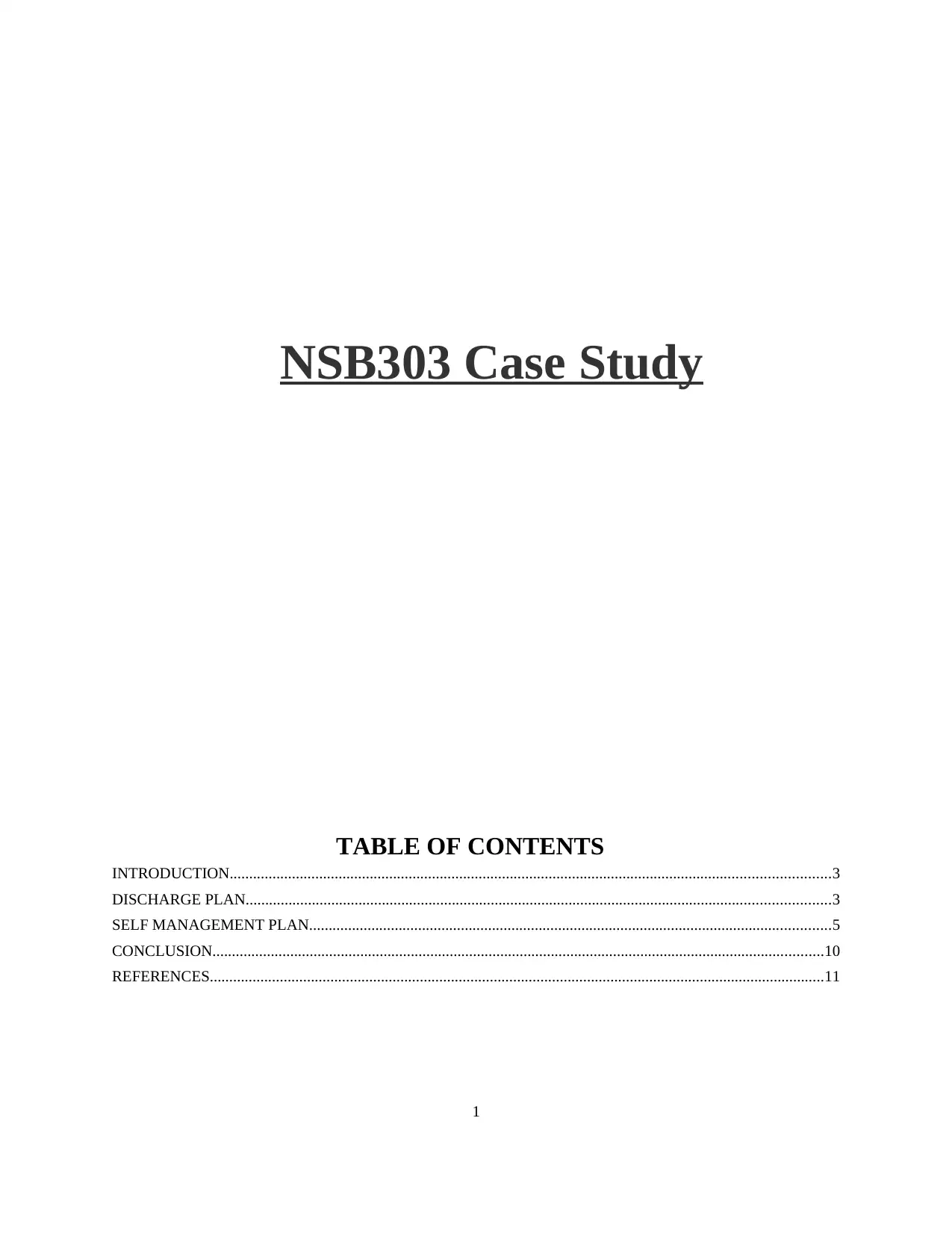
NSB303 Case Study
TABLE OF CONTENTS
INTRODUCTION..........................................................................................................................................................3
DISCHARGE PLAN......................................................................................................................................................3
SELF MANAGEMENT PLAN......................................................................................................................................5
CONCLUSION.............................................................................................................................................................10
REFERENCES..............................................................................................................................................................11
1
TABLE OF CONTENTS
INTRODUCTION..........................................................................................................................................................3
DISCHARGE PLAN......................................................................................................................................................3
SELF MANAGEMENT PLAN......................................................................................................................................5
CONCLUSION.............................................................................................................................................................10
REFERENCES..............................................................................................................................................................11
1
Paraphrase This Document
Need a fresh take? Get an instant paraphrase of this document with our AI Paraphraser
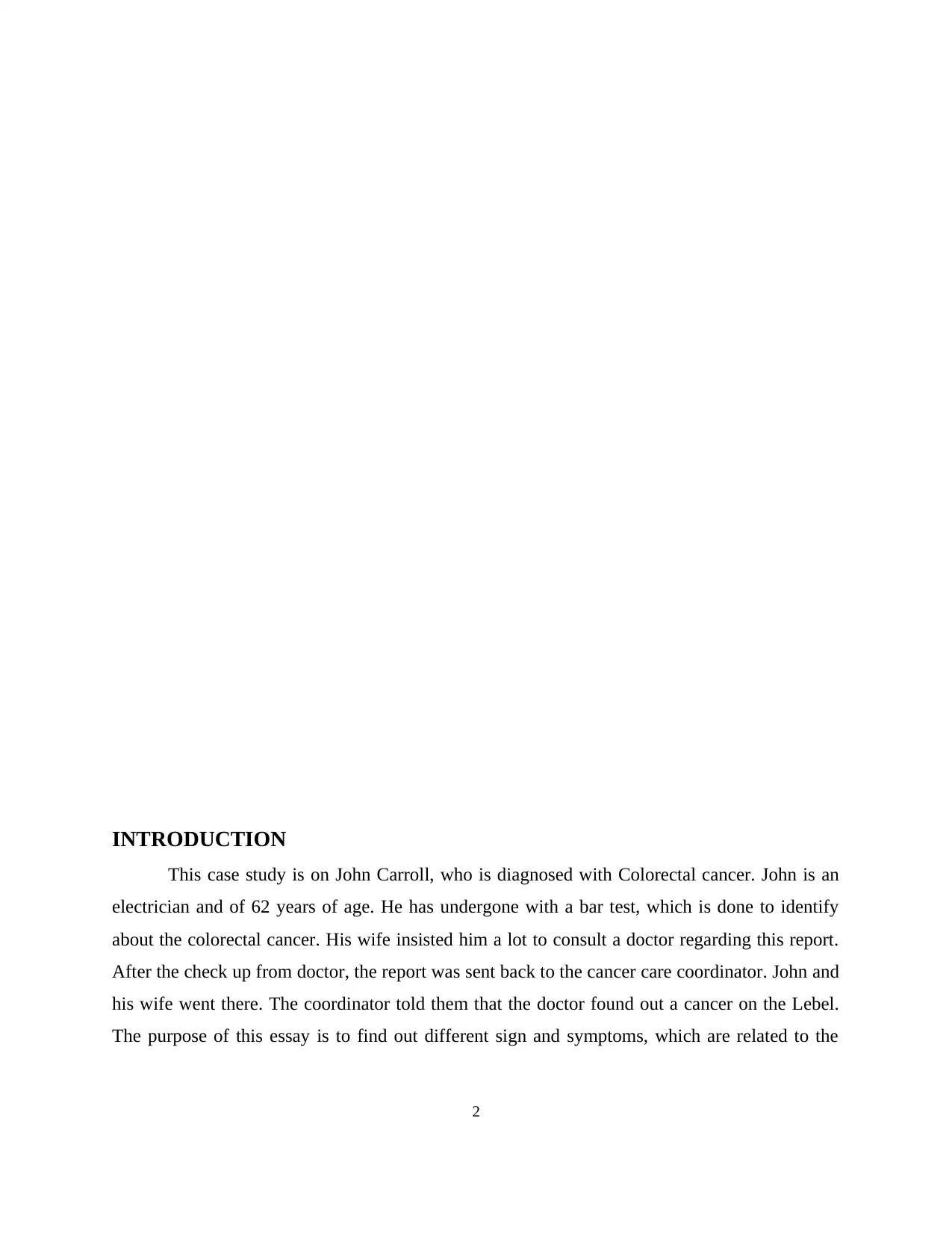
INTRODUCTION
This case study is on John Carroll, who is diagnosed with Colorectal cancer. John is an
electrician and of 62 years of age. He has undergone with a bar test, which is done to identify
about the colorectal cancer. His wife insisted him a lot to consult a doctor regarding this report.
After the check up from doctor, the report was sent back to the cancer care coordinator. John and
his wife went there. The coordinator told them that the doctor found out a cancer on the Lebel.
The purpose of this essay is to find out different sign and symptoms, which are related to the
2
This case study is on John Carroll, who is diagnosed with Colorectal cancer. John is an
electrician and of 62 years of age. He has undergone with a bar test, which is done to identify
about the colorectal cancer. His wife insisted him a lot to consult a doctor regarding this report.
After the check up from doctor, the report was sent back to the cancer care coordinator. John and
his wife went there. The coordinator told them that the doctor found out a cancer on the Lebel.
The purpose of this essay is to find out different sign and symptoms, which are related to the
2
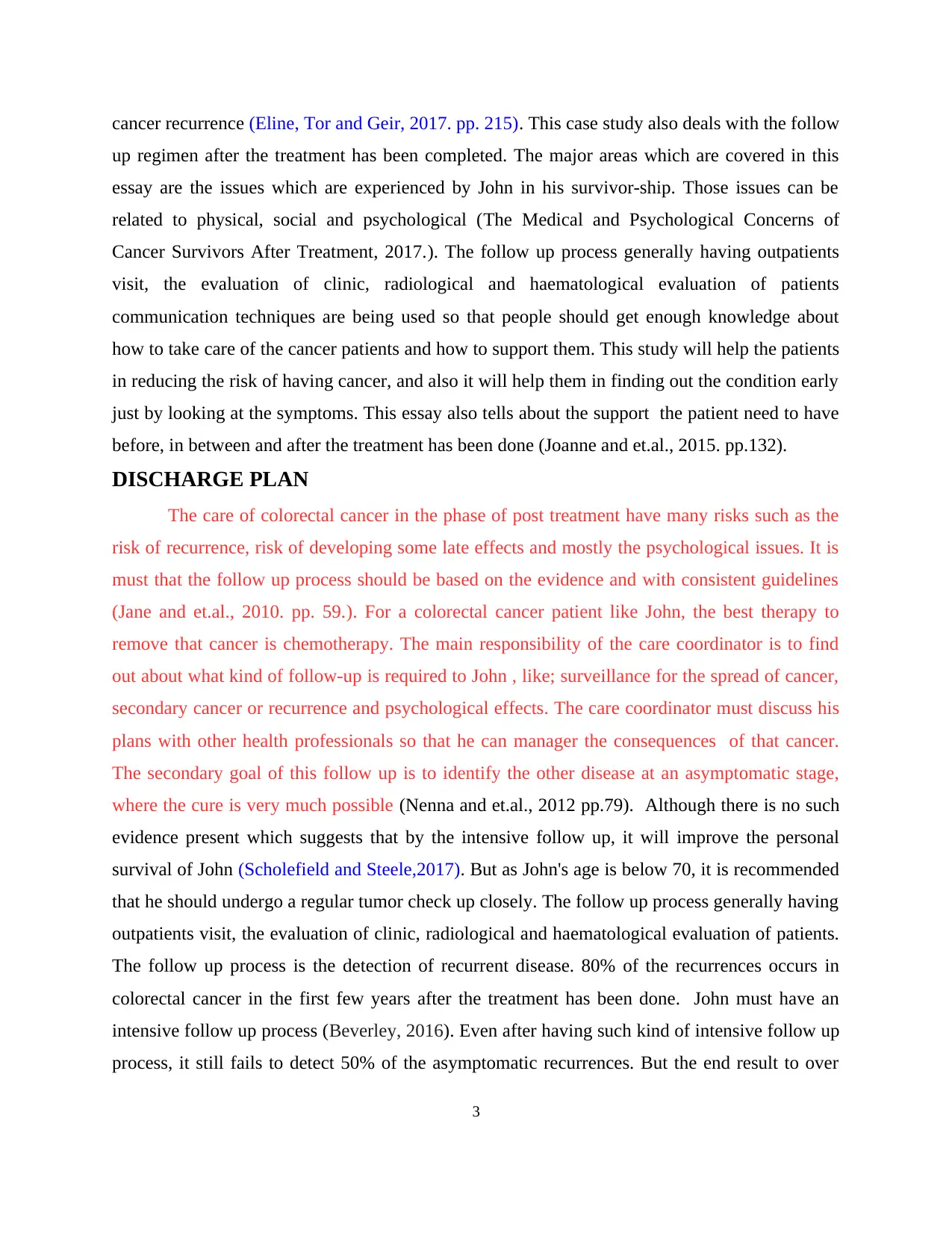
cancer recurrence (Eline, Tor and Geir, 2017. pp. 215). This case study also deals with the follow
up regimen after the treatment has been completed. The major areas which are covered in this
essay are the issues which are experienced by John in his survivor-ship. Those issues can be
related to physical, social and psychological (The Medical and Psychological Concerns of
Cancer Survivors After Treatment, 2017.). The follow up process generally having outpatients
visit, the evaluation of clinic, radiological and haematological evaluation of patients
communication techniques are being used so that people should get enough knowledge about
how to take care of the cancer patients and how to support them. This study will help the patients
in reducing the risk of having cancer, and also it will help them in finding out the condition early
just by looking at the symptoms. This essay also tells about the support the patient need to have
before, in between and after the treatment has been done (Joanne and et.al., 2015. pp.132).
DISCHARGE PLAN
The care of colorectal cancer in the phase of post treatment have many risks such as the
risk of recurrence, risk of developing some late effects and mostly the psychological issues. It is
must that the follow up process should be based on the evidence and with consistent guidelines
(Jane and et.al., 2010. pp. 59.). For a colorectal cancer patient like John, the best therapy to
remove that cancer is chemotherapy. The main responsibility of the care coordinator is to find
out about what kind of follow-up is required to John , like; surveillance for the spread of cancer,
secondary cancer or recurrence and psychological effects. The care coordinator must discuss his
plans with other health professionals so that he can manager the consequences of that cancer.
The secondary goal of this follow up is to identify the other disease at an asymptomatic stage,
where the cure is very much possible (Nenna and et.al., 2012 pp.79). Although there is no such
evidence present which suggests that by the intensive follow up, it will improve the personal
survival of John (Scholefield and Steele,2017). But as John's age is below 70, it is recommended
that he should undergo a regular tumor check up closely. The follow up process generally having
outpatients visit, the evaluation of clinic, radiological and haematological evaluation of patients.
The follow up process is the detection of recurrent disease. 80% of the recurrences occurs in
colorectal cancer in the first few years after the treatment has been done. John must have an
intensive follow up process (Beverley, 2016). Even after having such kind of intensive follow up
process, it still fails to detect 50% of the asymptomatic recurrences. But the end result to over
3
up regimen after the treatment has been completed. The major areas which are covered in this
essay are the issues which are experienced by John in his survivor-ship. Those issues can be
related to physical, social and psychological (The Medical and Psychological Concerns of
Cancer Survivors After Treatment, 2017.). The follow up process generally having outpatients
visit, the evaluation of clinic, radiological and haematological evaluation of patients
communication techniques are being used so that people should get enough knowledge about
how to take care of the cancer patients and how to support them. This study will help the patients
in reducing the risk of having cancer, and also it will help them in finding out the condition early
just by looking at the symptoms. This essay also tells about the support the patient need to have
before, in between and after the treatment has been done (Joanne and et.al., 2015. pp.132).
DISCHARGE PLAN
The care of colorectal cancer in the phase of post treatment have many risks such as the
risk of recurrence, risk of developing some late effects and mostly the psychological issues. It is
must that the follow up process should be based on the evidence and with consistent guidelines
(Jane and et.al., 2010. pp. 59.). For a colorectal cancer patient like John, the best therapy to
remove that cancer is chemotherapy. The main responsibility of the care coordinator is to find
out about what kind of follow-up is required to John , like; surveillance for the spread of cancer,
secondary cancer or recurrence and psychological effects. The care coordinator must discuss his
plans with other health professionals so that he can manager the consequences of that cancer.
The secondary goal of this follow up is to identify the other disease at an asymptomatic stage,
where the cure is very much possible (Nenna and et.al., 2012 pp.79). Although there is no such
evidence present which suggests that by the intensive follow up, it will improve the personal
survival of John (Scholefield and Steele,2017). But as John's age is below 70, it is recommended
that he should undergo a regular tumor check up closely. The follow up process generally having
outpatients visit, the evaluation of clinic, radiological and haematological evaluation of patients.
The follow up process is the detection of recurrent disease. 80% of the recurrences occurs in
colorectal cancer in the first few years after the treatment has been done. John must have an
intensive follow up process (Beverley, 2016). Even after having such kind of intensive follow up
process, it still fails to detect 50% of the asymptomatic recurrences. But the end result to over
3
⊘ This is a preview!⊘
Do you want full access?
Subscribe today to unlock all pages.

Trusted by 1+ million students worldwide
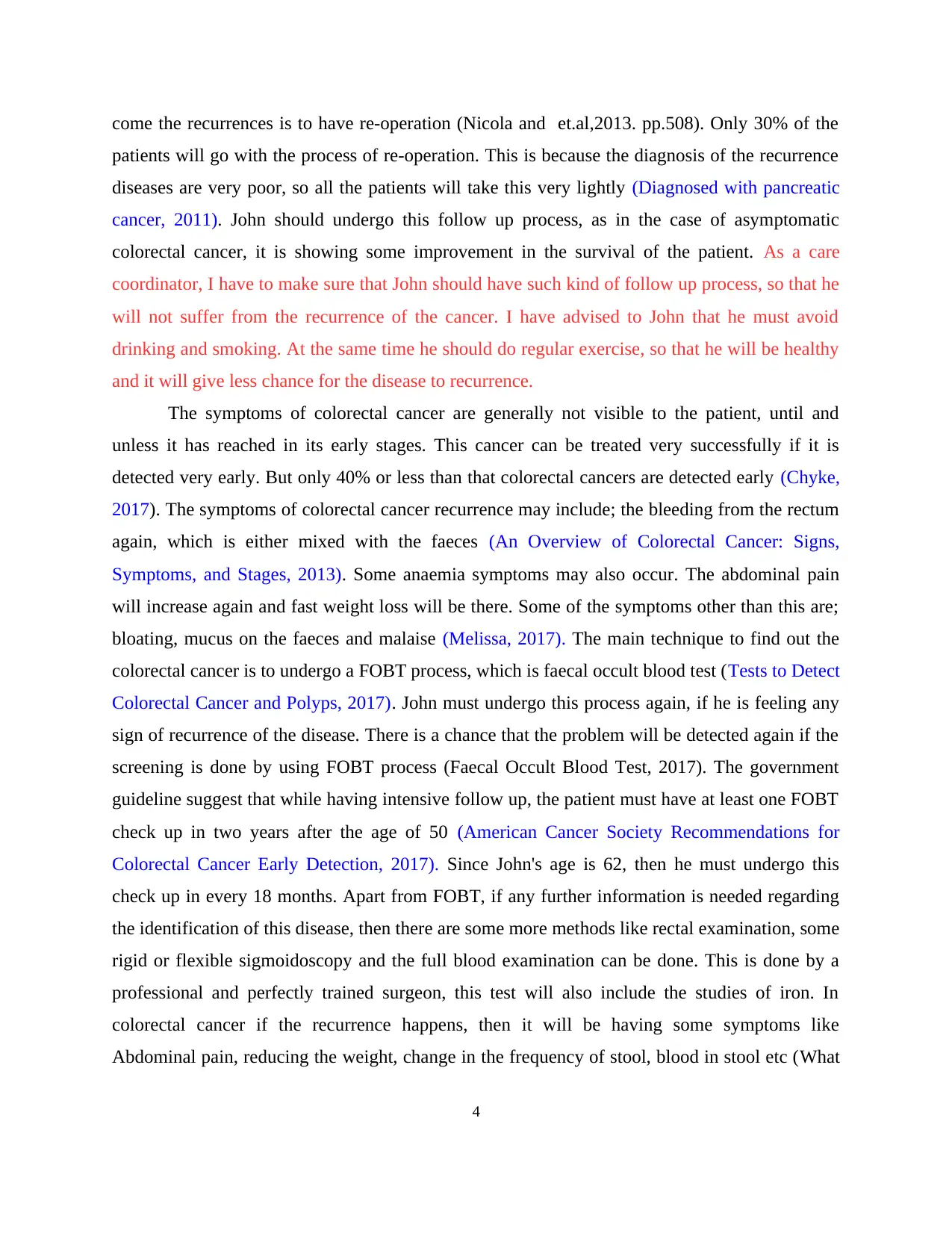
come the recurrences is to have re-operation (Nicola and et.al,2013. pp.508). Only 30% of the
patients will go with the process of re-operation. This is because the diagnosis of the recurrence
diseases are very poor, so all the patients will take this very lightly (Diagnosed with pancreatic
cancer, 2011). John should undergo this follow up process, as in the case of asymptomatic
colorectal cancer, it is showing some improvement in the survival of the patient. As a care
coordinator, I have to make sure that John should have such kind of follow up process, so that he
will not suffer from the recurrence of the cancer. I have advised to John that he must avoid
drinking and smoking. At the same time he should do regular exercise, so that he will be healthy
and it will give less chance for the disease to recurrence.
The symptoms of colorectal cancer are generally not visible to the patient, until and
unless it has reached in its early stages. This cancer can be treated very successfully if it is
detected very early. But only 40% or less than that colorectal cancers are detected early (Chyke,
2017). The symptoms of colorectal cancer recurrence may include; the bleeding from the rectum
again, which is either mixed with the faeces (An Overview of Colorectal Cancer: Signs,
Symptoms, and Stages, 2013). Some anaemia symptoms may also occur. The abdominal pain
will increase again and fast weight loss will be there. Some of the symptoms other than this are;
bloating, mucus on the faeces and malaise (Melissa, 2017). The main technique to find out the
colorectal cancer is to undergo a FOBT process, which is faecal occult blood test (Tests to Detect
Colorectal Cancer and Polyps, 2017). John must undergo this process again, if he is feeling any
sign of recurrence of the disease. There is a chance that the problem will be detected again if the
screening is done by using FOBT process (Faecal Occult Blood Test, 2017). The government
guideline suggest that while having intensive follow up, the patient must have at least one FOBT
check up in two years after the age of 50 (American Cancer Society Recommendations for
Colorectal Cancer Early Detection, 2017). Since John's age is 62, then he must undergo this
check up in every 18 months. Apart from FOBT, if any further information is needed regarding
the identification of this disease, then there are some more methods like rectal examination, some
rigid or flexible sigmoidoscopy and the full blood examination can be done. This is done by a
professional and perfectly trained surgeon, this test will also include the studies of iron. In
colorectal cancer if the recurrence happens, then it will be having some symptoms like
Abdominal pain, reducing the weight, change in the frequency of stool, blood in stool etc (What
4
patients will go with the process of re-operation. This is because the diagnosis of the recurrence
diseases are very poor, so all the patients will take this very lightly (Diagnosed with pancreatic
cancer, 2011). John should undergo this follow up process, as in the case of asymptomatic
colorectal cancer, it is showing some improvement in the survival of the patient. As a care
coordinator, I have to make sure that John should have such kind of follow up process, so that he
will not suffer from the recurrence of the cancer. I have advised to John that he must avoid
drinking and smoking. At the same time he should do regular exercise, so that he will be healthy
and it will give less chance for the disease to recurrence.
The symptoms of colorectal cancer are generally not visible to the patient, until and
unless it has reached in its early stages. This cancer can be treated very successfully if it is
detected very early. But only 40% or less than that colorectal cancers are detected early (Chyke,
2017). The symptoms of colorectal cancer recurrence may include; the bleeding from the rectum
again, which is either mixed with the faeces (An Overview of Colorectal Cancer: Signs,
Symptoms, and Stages, 2013). Some anaemia symptoms may also occur. The abdominal pain
will increase again and fast weight loss will be there. Some of the symptoms other than this are;
bloating, mucus on the faeces and malaise (Melissa, 2017). The main technique to find out the
colorectal cancer is to undergo a FOBT process, which is faecal occult blood test (Tests to Detect
Colorectal Cancer and Polyps, 2017). John must undergo this process again, if he is feeling any
sign of recurrence of the disease. There is a chance that the problem will be detected again if the
screening is done by using FOBT process (Faecal Occult Blood Test, 2017). The government
guideline suggest that while having intensive follow up, the patient must have at least one FOBT
check up in two years after the age of 50 (American Cancer Society Recommendations for
Colorectal Cancer Early Detection, 2017). Since John's age is 62, then he must undergo this
check up in every 18 months. Apart from FOBT, if any further information is needed regarding
the identification of this disease, then there are some more methods like rectal examination, some
rigid or flexible sigmoidoscopy and the full blood examination can be done. This is done by a
professional and perfectly trained surgeon, this test will also include the studies of iron. In
colorectal cancer if the recurrence happens, then it will be having some symptoms like
Abdominal pain, reducing the weight, change in the frequency of stool, blood in stool etc (What
4
Paraphrase This Document
Need a fresh take? Get an instant paraphrase of this document with our AI Paraphraser
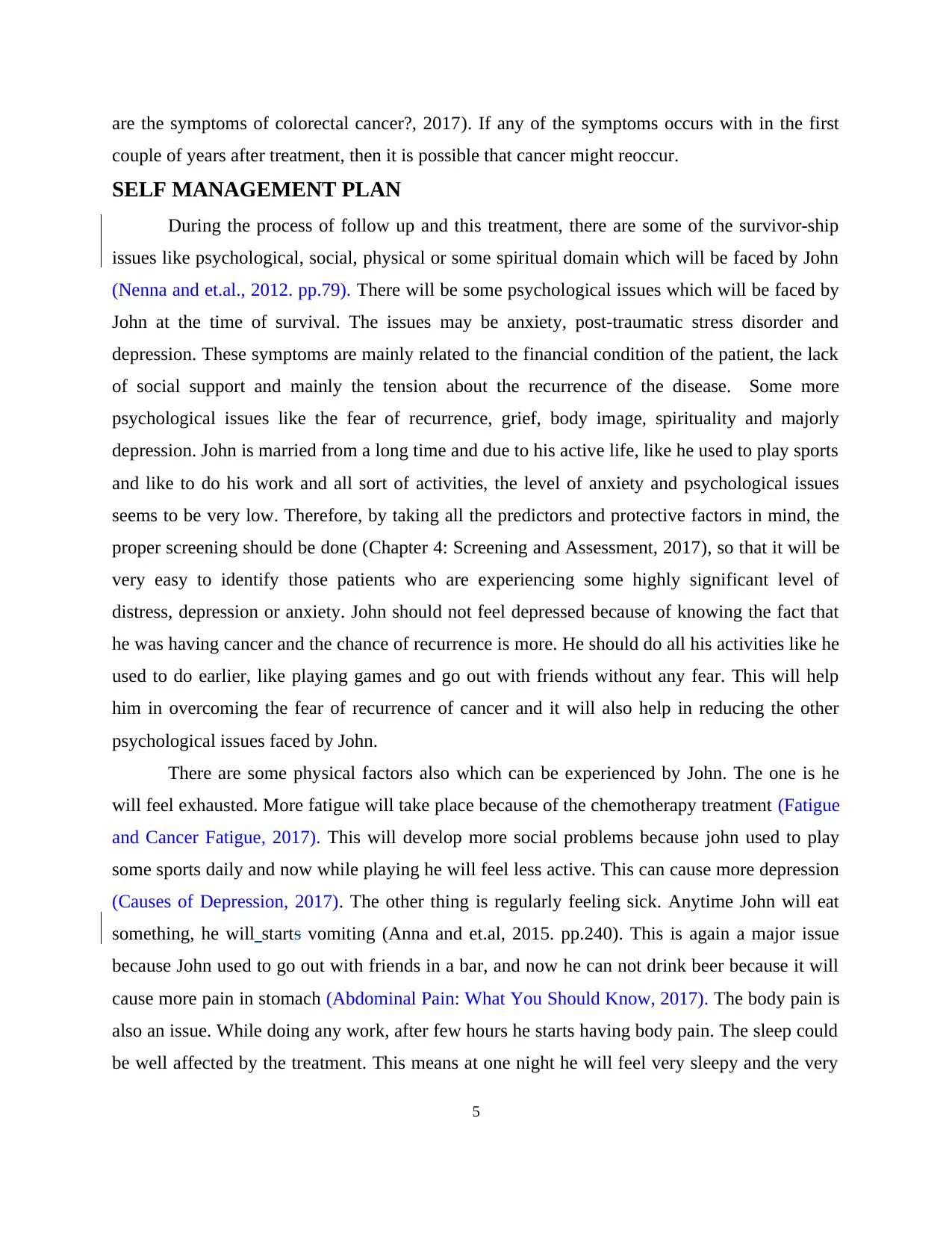
are the symptoms of colorectal cancer?, 2017). If any of the symptoms occurs with in the first
couple of years after treatment, then it is possible that cancer might reoccur.
SELF MANAGEMENT PLAN
During the process of follow up and this treatment, there are some of the survivor-ship
issues like psychological, social, physical or some spiritual domain which will be faced by John
(Nenna and et.al., 2012. pp.79). There will be some psychological issues which will be faced by
John at the time of survival. The issues may be anxiety, post-traumatic stress disorder and
depression. These symptoms are mainly related to the financial condition of the patient, the lack
of social support and mainly the tension about the recurrence of the disease. Some more
psychological issues like the fear of recurrence, grief, body image, spirituality and majorly
depression. John is married from a long time and due to his active life, like he used to play sports
and like to do his work and all sort of activities, the level of anxiety and psychological issues
seems to be very low. Therefore, by taking all the predictors and protective factors in mind, the
proper screening should be done (Chapter 4: Screening and Assessment, 2017), so that it will be
very easy to identify those patients who are experiencing some highly significant level of
distress, depression or anxiety. John should not feel depressed because of knowing the fact that
he was having cancer and the chance of recurrence is more. He should do all his activities like he
used to do earlier, like playing games and go out with friends without any fear. This will help
him in overcoming the fear of recurrence of cancer and it will also help in reducing the other
psychological issues faced by John.
There are some physical factors also which can be experienced by John. The one is he
will feel exhausted. More fatigue will take place because of the chemotherapy treatment (Fatigue
and Cancer Fatigue, 2017). This will develop more social problems because john used to play
some sports daily and now while playing he will feel less active. This can cause more depression
(Causes of Depression, 2017). The other thing is regularly feeling sick. Anytime John will eat
something, he will starts vomiting (Anna and et.al, 2015. pp.240). This is again a major issue
because John used to go out with friends in a bar, and now he can not drink beer because it will
cause more pain in stomach (Abdominal Pain: What You Should Know, 2017). The body pain is
also an issue. While doing any work, after few hours he starts having body pain. The sleep could
be well affected by the treatment. This means at one night he will feel very sleepy and the very
5
couple of years after treatment, then it is possible that cancer might reoccur.
SELF MANAGEMENT PLAN
During the process of follow up and this treatment, there are some of the survivor-ship
issues like psychological, social, physical or some spiritual domain which will be faced by John
(Nenna and et.al., 2012. pp.79). There will be some psychological issues which will be faced by
John at the time of survival. The issues may be anxiety, post-traumatic stress disorder and
depression. These symptoms are mainly related to the financial condition of the patient, the lack
of social support and mainly the tension about the recurrence of the disease. Some more
psychological issues like the fear of recurrence, grief, body image, spirituality and majorly
depression. John is married from a long time and due to his active life, like he used to play sports
and like to do his work and all sort of activities, the level of anxiety and psychological issues
seems to be very low. Therefore, by taking all the predictors and protective factors in mind, the
proper screening should be done (Chapter 4: Screening and Assessment, 2017), so that it will be
very easy to identify those patients who are experiencing some highly significant level of
distress, depression or anxiety. John should not feel depressed because of knowing the fact that
he was having cancer and the chance of recurrence is more. He should do all his activities like he
used to do earlier, like playing games and go out with friends without any fear. This will help
him in overcoming the fear of recurrence of cancer and it will also help in reducing the other
psychological issues faced by John.
There are some physical factors also which can be experienced by John. The one is he
will feel exhausted. More fatigue will take place because of the chemotherapy treatment (Fatigue
and Cancer Fatigue, 2017). This will develop more social problems because john used to play
some sports daily and now while playing he will feel less active. This can cause more depression
(Causes of Depression, 2017). The other thing is regularly feeling sick. Anytime John will eat
something, he will starts vomiting (Anna and et.al, 2015. pp.240). This is again a major issue
because John used to go out with friends in a bar, and now he can not drink beer because it will
cause more pain in stomach (Abdominal Pain: What You Should Know, 2017). The body pain is
also an issue. While doing any work, after few hours he starts having body pain. The sleep could
be well affected by the treatment. This means at one night he will feel very sleepy and the very
5
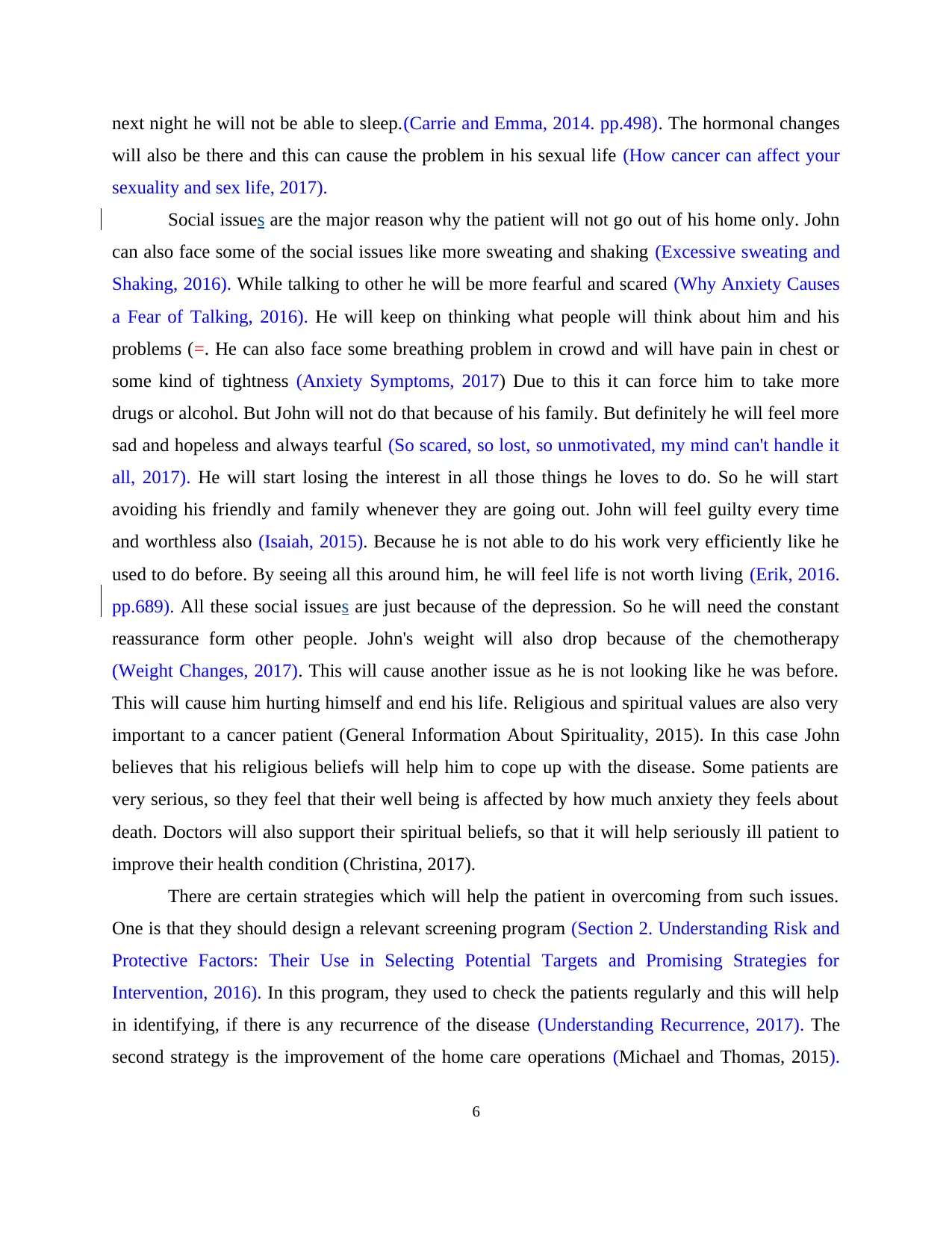
next night he will not be able to sleep.(Carrie and Emma, 2014. pp.498). The hormonal changes
will also be there and this can cause the problem in his sexual life (How cancer can affect your
sexuality and sex life, 2017).
Social issues are the major reason why the patient will not go out of his home only. John
can also face some of the social issues like more sweating and shaking (Excessive sweating and
Shaking, 2016). While talking to other he will be more fearful and scared (Why Anxiety Causes
a Fear of Talking, 2016). He will keep on thinking what people will think about him and his
problems (=. He can also face some breathing problem in crowd and will have pain in chest or
some kind of tightness (Anxiety Symptoms, 2017) Due to this it can force him to take more
drugs or alcohol. But John will not do that because of his family. But definitely he will feel more
sad and hopeless and always tearful (So scared, so lost, so unmotivated, my mind can't handle it
all, 2017). He will start losing the interest in all those things he loves to do. So he will start
avoiding his friendly and family whenever they are going out. John will feel guilty every time
and worthless also (Isaiah, 2015). Because he is not able to do his work very efficiently like he
used to do before. By seeing all this around him, he will feel life is not worth living (Erik, 2016.
pp.689). All these social issues are just because of the depression. So he will need the constant
reassurance form other people. John's weight will also drop because of the chemotherapy
(Weight Changes, 2017). This will cause another issue as he is not looking like he was before.
This will cause him hurting himself and end his life. Religious and spiritual values are also very
important to a cancer patient (General Information About Spirituality, 2015). In this case John
believes that his religious beliefs will help him to cope up with the disease. Some patients are
very serious, so they feel that their well being is affected by how much anxiety they feels about
death. Doctors will also support their spiritual beliefs, so that it will help seriously ill patient to
improve their health condition (Christina, 2017).
There are certain strategies which will help the patient in overcoming from such issues.
One is that they should design a relevant screening program (Section 2. Understanding Risk and
Protective Factors: Their Use in Selecting Potential Targets and Promising Strategies for
Intervention, 2016). In this program, they used to check the patients regularly and this will help
in identifying, if there is any recurrence of the disease (Understanding Recurrence, 2017). The
second strategy is the improvement of the home care operations (Michael and Thomas, 2015).
6
will also be there and this can cause the problem in his sexual life (How cancer can affect your
sexuality and sex life, 2017).
Social issues are the major reason why the patient will not go out of his home only. John
can also face some of the social issues like more sweating and shaking (Excessive sweating and
Shaking, 2016). While talking to other he will be more fearful and scared (Why Anxiety Causes
a Fear of Talking, 2016). He will keep on thinking what people will think about him and his
problems (=. He can also face some breathing problem in crowd and will have pain in chest or
some kind of tightness (Anxiety Symptoms, 2017) Due to this it can force him to take more
drugs or alcohol. But John will not do that because of his family. But definitely he will feel more
sad and hopeless and always tearful (So scared, so lost, so unmotivated, my mind can't handle it
all, 2017). He will start losing the interest in all those things he loves to do. So he will start
avoiding his friendly and family whenever they are going out. John will feel guilty every time
and worthless also (Isaiah, 2015). Because he is not able to do his work very efficiently like he
used to do before. By seeing all this around him, he will feel life is not worth living (Erik, 2016.
pp.689). All these social issues are just because of the depression. So he will need the constant
reassurance form other people. John's weight will also drop because of the chemotherapy
(Weight Changes, 2017). This will cause another issue as he is not looking like he was before.
This will cause him hurting himself and end his life. Religious and spiritual values are also very
important to a cancer patient (General Information About Spirituality, 2015). In this case John
believes that his religious beliefs will help him to cope up with the disease. Some patients are
very serious, so they feel that their well being is affected by how much anxiety they feels about
death. Doctors will also support their spiritual beliefs, so that it will help seriously ill patient to
improve their health condition (Christina, 2017).
There are certain strategies which will help the patient in overcoming from such issues.
One is that they should design a relevant screening program (Section 2. Understanding Risk and
Protective Factors: Their Use in Selecting Potential Targets and Promising Strategies for
Intervention, 2016). In this program, they used to check the patients regularly and this will help
in identifying, if there is any recurrence of the disease (Understanding Recurrence, 2017). The
second strategy is the improvement of the home care operations (Michael and Thomas, 2015).
6
⊘ This is a preview!⊘
Do you want full access?
Subscribe today to unlock all pages.

Trusted by 1+ million students worldwide
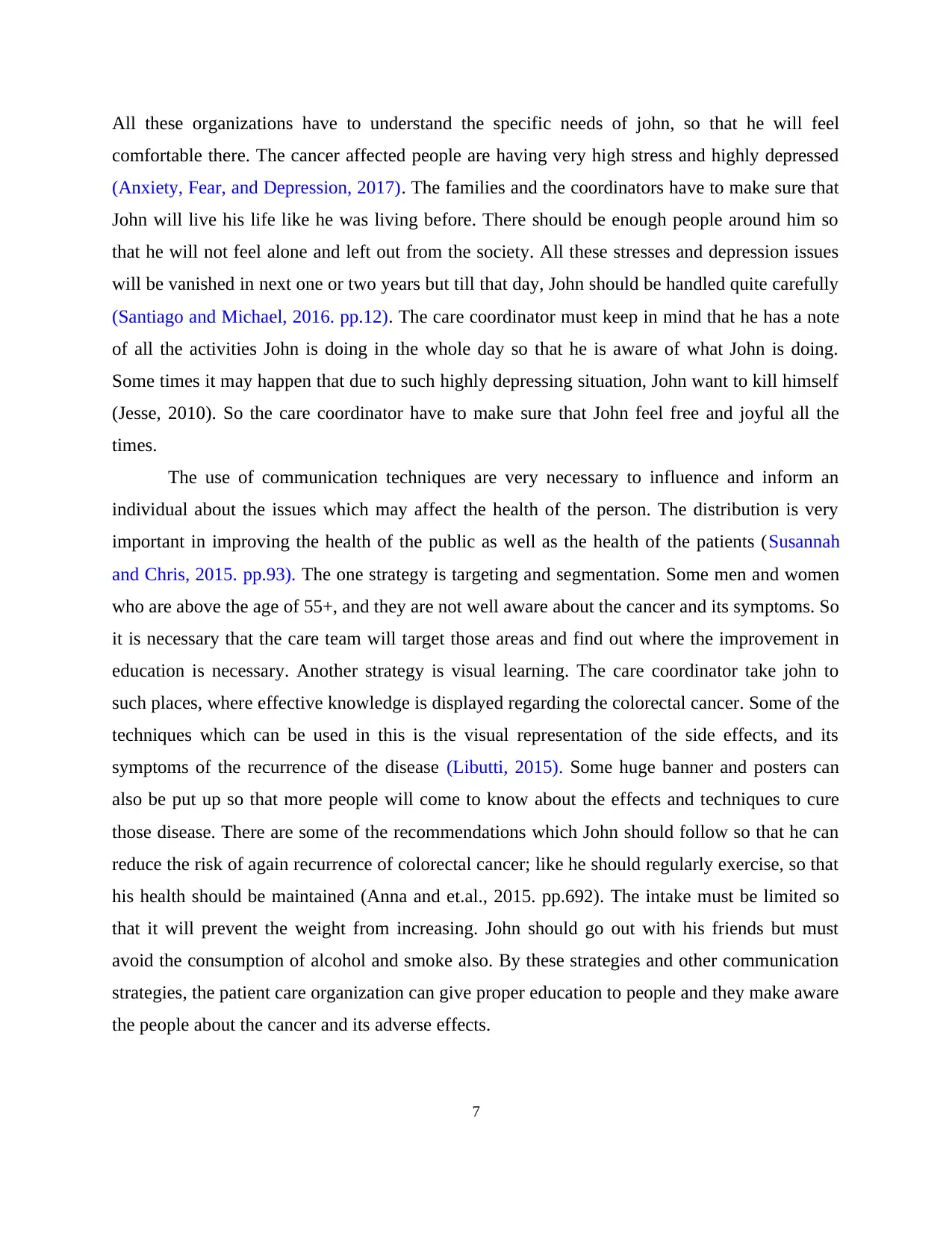
All these organizations have to understand the specific needs of john, so that he will feel
comfortable there. The cancer affected people are having very high stress and highly depressed
(Anxiety, Fear, and Depression, 2017). The families and the coordinators have to make sure that
John will live his life like he was living before. There should be enough people around him so
that he will not feel alone and left out from the society. All these stresses and depression issues
will be vanished in next one or two years but till that day, John should be handled quite carefully
(Santiago and Michael, 2016. pp.12). The care coordinator must keep in mind that he has a note
of all the activities John is doing in the whole day so that he is aware of what John is doing.
Some times it may happen that due to such highly depressing situation, John want to kill himself
(Jesse, 2010). So the care coordinator have to make sure that John feel free and joyful all the
times.
The use of communication techniques are very necessary to influence and inform an
individual about the issues which may affect the health of the person. The distribution is very
important in improving the health of the public as well as the health of the patients (Susannah
and Chris, 2015. pp.93). The one strategy is targeting and segmentation. Some men and women
who are above the age of 55+, and they are not well aware about the cancer and its symptoms. So
it is necessary that the care team will target those areas and find out where the improvement in
education is necessary. Another strategy is visual learning. The care coordinator take john to
such places, where effective knowledge is displayed regarding the colorectal cancer. Some of the
techniques which can be used in this is the visual representation of the side effects, and its
symptoms of the recurrence of the disease (Libutti, 2015). Some huge banner and posters can
also be put up so that more people will come to know about the effects and techniques to cure
those disease. There are some of the recommendations which John should follow so that he can
reduce the risk of again recurrence of colorectal cancer; like he should regularly exercise, so that
his health should be maintained (Anna and et.al., 2015. pp.692). The intake must be limited so
that it will prevent the weight from increasing. John should go out with his friends but must
avoid the consumption of alcohol and smoke also. By these strategies and other communication
strategies, the patient care organization can give proper education to people and they make aware
the people about the cancer and its adverse effects.
7
comfortable there. The cancer affected people are having very high stress and highly depressed
(Anxiety, Fear, and Depression, 2017). The families and the coordinators have to make sure that
John will live his life like he was living before. There should be enough people around him so
that he will not feel alone and left out from the society. All these stresses and depression issues
will be vanished in next one or two years but till that day, John should be handled quite carefully
(Santiago and Michael, 2016. pp.12). The care coordinator must keep in mind that he has a note
of all the activities John is doing in the whole day so that he is aware of what John is doing.
Some times it may happen that due to such highly depressing situation, John want to kill himself
(Jesse, 2010). So the care coordinator have to make sure that John feel free and joyful all the
times.
The use of communication techniques are very necessary to influence and inform an
individual about the issues which may affect the health of the person. The distribution is very
important in improving the health of the public as well as the health of the patients (Susannah
and Chris, 2015. pp.93). The one strategy is targeting and segmentation. Some men and women
who are above the age of 55+, and they are not well aware about the cancer and its symptoms. So
it is necessary that the care team will target those areas and find out where the improvement in
education is necessary. Another strategy is visual learning. The care coordinator take john to
such places, where effective knowledge is displayed regarding the colorectal cancer. Some of the
techniques which can be used in this is the visual representation of the side effects, and its
symptoms of the recurrence of the disease (Libutti, 2015). Some huge banner and posters can
also be put up so that more people will come to know about the effects and techniques to cure
those disease. There are some of the recommendations which John should follow so that he can
reduce the risk of again recurrence of colorectal cancer; like he should regularly exercise, so that
his health should be maintained (Anna and et.al., 2015. pp.692). The intake must be limited so
that it will prevent the weight from increasing. John should go out with his friends but must
avoid the consumption of alcohol and smoke also. By these strategies and other communication
strategies, the patient care organization can give proper education to people and they make aware
the people about the cancer and its adverse effects.
7
Paraphrase This Document
Need a fresh take? Get an instant paraphrase of this document with our AI Paraphraser
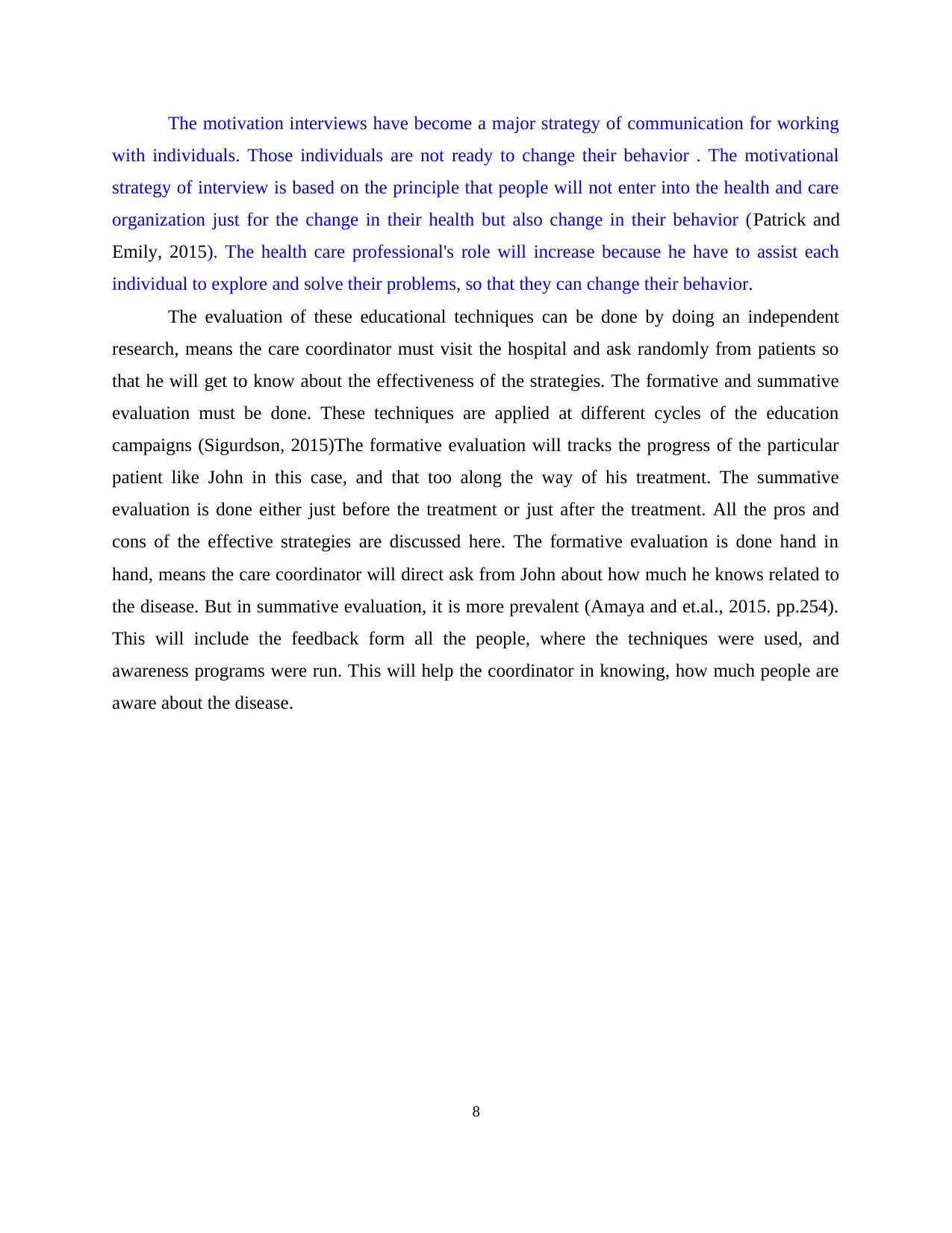
The motivation interviews have become a major strategy of communication for working
with individuals. Those individuals are not ready to change their behavior . The motivational
strategy of interview is based on the principle that people will not enter into the health and care
organization just for the change in their health but also change in their behavior (Patrick and
Emily, 2015). The health care professional's role will increase because he have to assist each
individual to explore and solve their problems, so that they can change their behavior.
The evaluation of these educational techniques can be done by doing an independent
research, means the care coordinator must visit the hospital and ask randomly from patients so
that he will get to know about the effectiveness of the strategies. The formative and summative
evaluation must be done. These techniques are applied at different cycles of the education
campaigns (Sigurdson, 2015)The formative evaluation will tracks the progress of the particular
patient like John in this case, and that too along the way of his treatment. The summative
evaluation is done either just before the treatment or just after the treatment. All the pros and
cons of the effective strategies are discussed here. The formative evaluation is done hand in
hand, means the care coordinator will direct ask from John about how much he knows related to
the disease. But in summative evaluation, it is more prevalent (Amaya and et.al., 2015. pp.254).
This will include the feedback form all the people, where the techniques were used, and
awareness programs were run. This will help the coordinator in knowing, how much people are
aware about the disease.
8
with individuals. Those individuals are not ready to change their behavior . The motivational
strategy of interview is based on the principle that people will not enter into the health and care
organization just for the change in their health but also change in their behavior (Patrick and
Emily, 2015). The health care professional's role will increase because he have to assist each
individual to explore and solve their problems, so that they can change their behavior.
The evaluation of these educational techniques can be done by doing an independent
research, means the care coordinator must visit the hospital and ask randomly from patients so
that he will get to know about the effectiveness of the strategies. The formative and summative
evaluation must be done. These techniques are applied at different cycles of the education
campaigns (Sigurdson, 2015)The formative evaluation will tracks the progress of the particular
patient like John in this case, and that too along the way of his treatment. The summative
evaluation is done either just before the treatment or just after the treatment. All the pros and
cons of the effective strategies are discussed here. The formative evaluation is done hand in
hand, means the care coordinator will direct ask from John about how much he knows related to
the disease. But in summative evaluation, it is more prevalent (Amaya and et.al., 2015. pp.254).
This will include the feedback form all the people, where the techniques were used, and
awareness programs were run. This will help the coordinator in knowing, how much people are
aware about the disease.
8
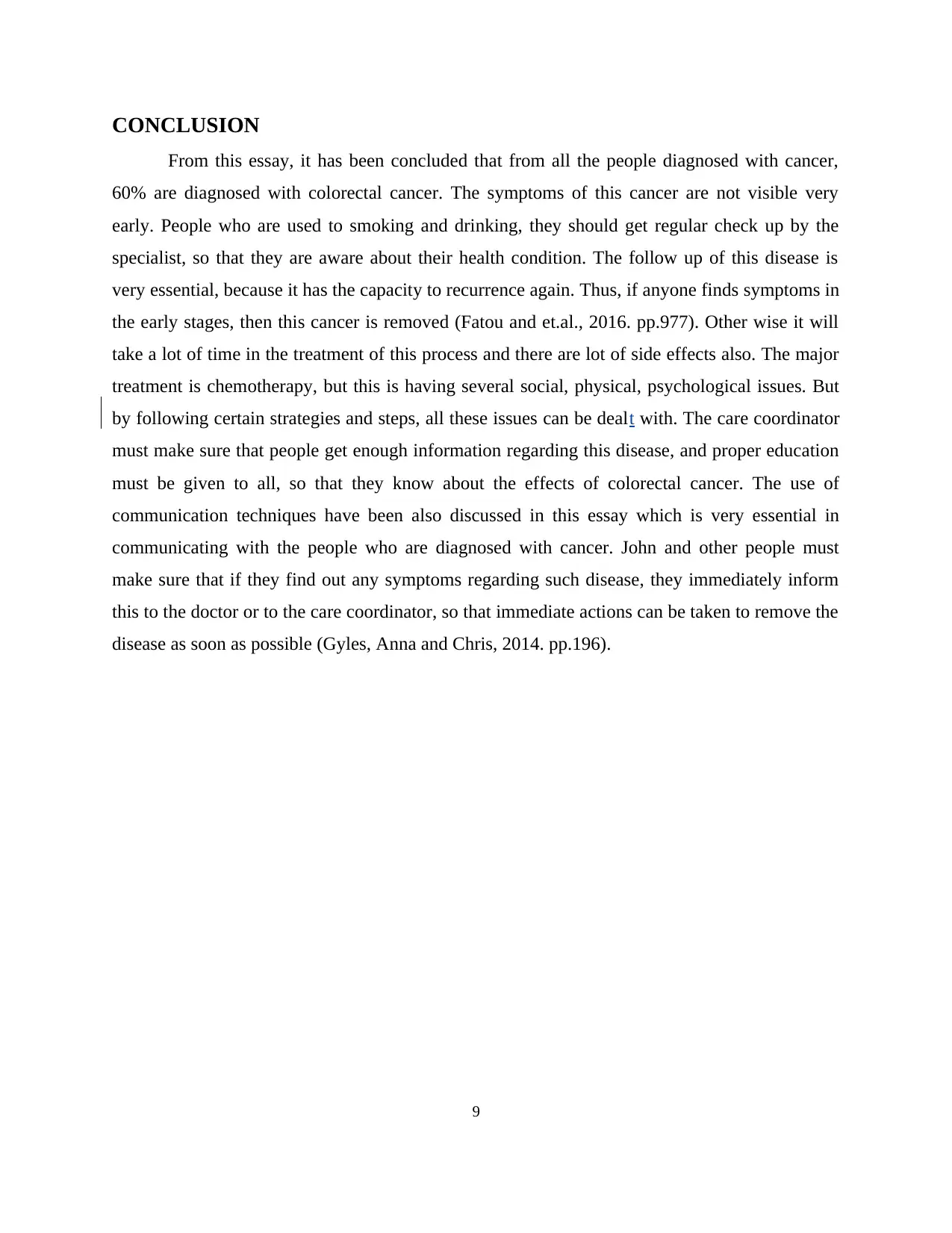
CONCLUSION
From this essay, it has been concluded that from all the people diagnosed with cancer,
60% are diagnosed with colorectal cancer. The symptoms of this cancer are not visible very
early. People who are used to smoking and drinking, they should get regular check up by the
specialist, so that they are aware about their health condition. The follow up of this disease is
very essential, because it has the capacity to recurrence again. Thus, if anyone finds symptoms in
the early stages, then this cancer is removed (Fatou and et.al., 2016. pp.977). Other wise it will
take a lot of time in the treatment of this process and there are lot of side effects also. The major
treatment is chemotherapy, but this is having several social, physical, psychological issues. But
by following certain strategies and steps, all these issues can be dealt with. The care coordinator
must make sure that people get enough information regarding this disease, and proper education
must be given to all, so that they know about the effects of colorectal cancer. The use of
communication techniques have been also discussed in this essay which is very essential in
communicating with the people who are diagnosed with cancer. John and other people must
make sure that if they find out any symptoms regarding such disease, they immediately inform
this to the doctor or to the care coordinator, so that immediate actions can be taken to remove the
disease as soon as possible (Gyles, Anna and Chris, 2014. pp.196).
9
From this essay, it has been concluded that from all the people diagnosed with cancer,
60% are diagnosed with colorectal cancer. The symptoms of this cancer are not visible very
early. People who are used to smoking and drinking, they should get regular check up by the
specialist, so that they are aware about their health condition. The follow up of this disease is
very essential, because it has the capacity to recurrence again. Thus, if anyone finds symptoms in
the early stages, then this cancer is removed (Fatou and et.al., 2016. pp.977). Other wise it will
take a lot of time in the treatment of this process and there are lot of side effects also. The major
treatment is chemotherapy, but this is having several social, physical, psychological issues. But
by following certain strategies and steps, all these issues can be dealt with. The care coordinator
must make sure that people get enough information regarding this disease, and proper education
must be given to all, so that they know about the effects of colorectal cancer. The use of
communication techniques have been also discussed in this essay which is very essential in
communicating with the people who are diagnosed with cancer. John and other people must
make sure that if they find out any symptoms regarding such disease, they immediately inform
this to the doctor or to the care coordinator, so that immediate actions can be taken to remove the
disease as soon as possible (Gyles, Anna and Chris, 2014. pp.196).
9
⊘ This is a preview!⊘
Do you want full access?
Subscribe today to unlock all pages.

Trusted by 1+ million students worldwide
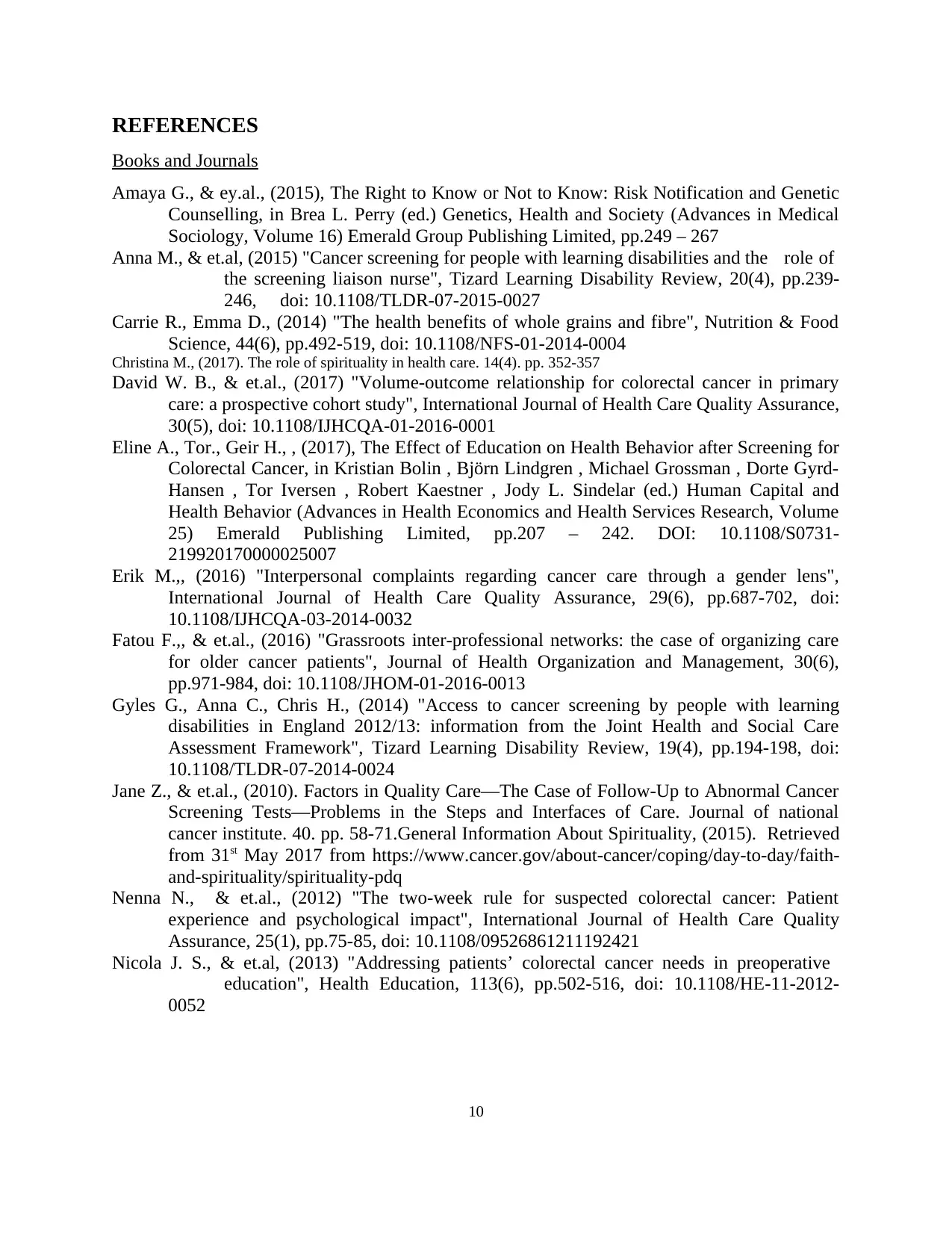
REFERENCES
Books and Journals
Amaya G., & ey.al., (2015), The Right to Know or Not to Know: Risk Notification and Genetic
Counselling, in Brea L. Perry (ed.) Genetics, Health and Society (Advances in Medical
Sociology, Volume 16) Emerald Group Publishing Limited, pp.249 – 267
Anna M., & et.al, (2015) "Cancer screening for people with learning disabilities and the role of
the screening liaison nurse", Tizard Learning Disability Review, 20(4), pp.239-
246, doi: 10.1108/TLDR-07-2015-0027
Carrie R., Emma D., (2014) "The health benefits of whole grains and fibre", Nutrition & Food
Science, 44(6), pp.492-519, doi: 10.1108/NFS-01-2014-0004
Christina M., (2017). The role of spirituality in health care. 14(4). pp. 352-357
David W. B., & et.al., (2017) "Volume-outcome relationship for colorectal cancer in primary
care: a prospective cohort study", International Journal of Health Care Quality Assurance,
30(5), doi: 10.1108/IJHCQA-01-2016-0001
Eline A., Tor., Geir H., , (2017), The Effect of Education on Health Behavior after Screening for
Colorectal Cancer, in Kristian Bolin , Björn Lindgren , Michael Grossman , Dorte Gyrd-
Hansen , Tor Iversen , Robert Kaestner , Jody L. Sindelar (ed.) Human Capital and
Health Behavior (Advances in Health Economics and Health Services Research, Volume
25) Emerald Publishing Limited, pp.207 – 242. DOI: 10.1108/S0731-
219920170000025007
Erik M.,, (2016) "Interpersonal complaints regarding cancer care through a gender lens",
International Journal of Health Care Quality Assurance, 29(6), pp.687-702, doi:
10.1108/IJHCQA-03-2014-0032
Fatou F.,, & et.al., (2016) "Grassroots inter-professional networks: the case of organizing care
for older cancer patients", Journal of Health Organization and Management, 30(6),
pp.971-984, doi: 10.1108/JHOM-01-2016-0013
Gyles G., Anna C., Chris H., (2014) "Access to cancer screening by people with learning
disabilities in England 2012/13: information from the Joint Health and Social Care
Assessment Framework", Tizard Learning Disability Review, 19(4), pp.194-198, doi:
10.1108/TLDR-07-2014-0024
Jane Z., & et.al., (2010). Factors in Quality Care—The Case of Follow-Up to Abnormal Cancer
Screening Tests—Problems in the Steps and Interfaces of Care. Journal of national
cancer institute. 40. pp. 58-71.General Information About Spirituality, (2015). Retrieved
from 31st May 2017 from https://www.cancer.gov/about-cancer/coping/day-to-day/faith-
and-spirituality/spirituality-pdq
Nenna N., & et.al., (2012) "The two‐week rule for suspected colorectal cancer: Patient
experience and psychological impact", International Journal of Health Care Quality
Assurance, 25(1), pp.75-85, doi: 10.1108/09526861211192421
Nicola J. S., & et.al, (2013) "Addressing patients’ colorectal cancer needs in preoperative
education", Health Education, 113(6), pp.502-516, doi: 10.1108/HE-11-2012-
0052
10
Books and Journals
Amaya G., & ey.al., (2015), The Right to Know or Not to Know: Risk Notification and Genetic
Counselling, in Brea L. Perry (ed.) Genetics, Health and Society (Advances in Medical
Sociology, Volume 16) Emerald Group Publishing Limited, pp.249 – 267
Anna M., & et.al, (2015) "Cancer screening for people with learning disabilities and the role of
the screening liaison nurse", Tizard Learning Disability Review, 20(4), pp.239-
246, doi: 10.1108/TLDR-07-2015-0027
Carrie R., Emma D., (2014) "The health benefits of whole grains and fibre", Nutrition & Food
Science, 44(6), pp.492-519, doi: 10.1108/NFS-01-2014-0004
Christina M., (2017). The role of spirituality in health care. 14(4). pp. 352-357
David W. B., & et.al., (2017) "Volume-outcome relationship for colorectal cancer in primary
care: a prospective cohort study", International Journal of Health Care Quality Assurance,
30(5), doi: 10.1108/IJHCQA-01-2016-0001
Eline A., Tor., Geir H., , (2017), The Effect of Education on Health Behavior after Screening for
Colorectal Cancer, in Kristian Bolin , Björn Lindgren , Michael Grossman , Dorte Gyrd-
Hansen , Tor Iversen , Robert Kaestner , Jody L. Sindelar (ed.) Human Capital and
Health Behavior (Advances in Health Economics and Health Services Research, Volume
25) Emerald Publishing Limited, pp.207 – 242. DOI: 10.1108/S0731-
219920170000025007
Erik M.,, (2016) "Interpersonal complaints regarding cancer care through a gender lens",
International Journal of Health Care Quality Assurance, 29(6), pp.687-702, doi:
10.1108/IJHCQA-03-2014-0032
Fatou F.,, & et.al., (2016) "Grassroots inter-professional networks: the case of organizing care
for older cancer patients", Journal of Health Organization and Management, 30(6),
pp.971-984, doi: 10.1108/JHOM-01-2016-0013
Gyles G., Anna C., Chris H., (2014) "Access to cancer screening by people with learning
disabilities in England 2012/13: information from the Joint Health and Social Care
Assessment Framework", Tizard Learning Disability Review, 19(4), pp.194-198, doi:
10.1108/TLDR-07-2014-0024
Jane Z., & et.al., (2010). Factors in Quality Care—The Case of Follow-Up to Abnormal Cancer
Screening Tests—Problems in the Steps and Interfaces of Care. Journal of national
cancer institute. 40. pp. 58-71.General Information About Spirituality, (2015). Retrieved
from 31st May 2017 from https://www.cancer.gov/about-cancer/coping/day-to-day/faith-
and-spirituality/spirituality-pdq
Nenna N., & et.al., (2012) "The two‐week rule for suspected colorectal cancer: Patient
experience and psychological impact", International Journal of Health Care Quality
Assurance, 25(1), pp.75-85, doi: 10.1108/09526861211192421
Nicola J. S., & et.al, (2013) "Addressing patients’ colorectal cancer needs in preoperative
education", Health Education, 113(6), pp.502-516, doi: 10.1108/HE-11-2012-
0052
10
Paraphrase This Document
Need a fresh take? Get an instant paraphrase of this document with our AI Paraphraser
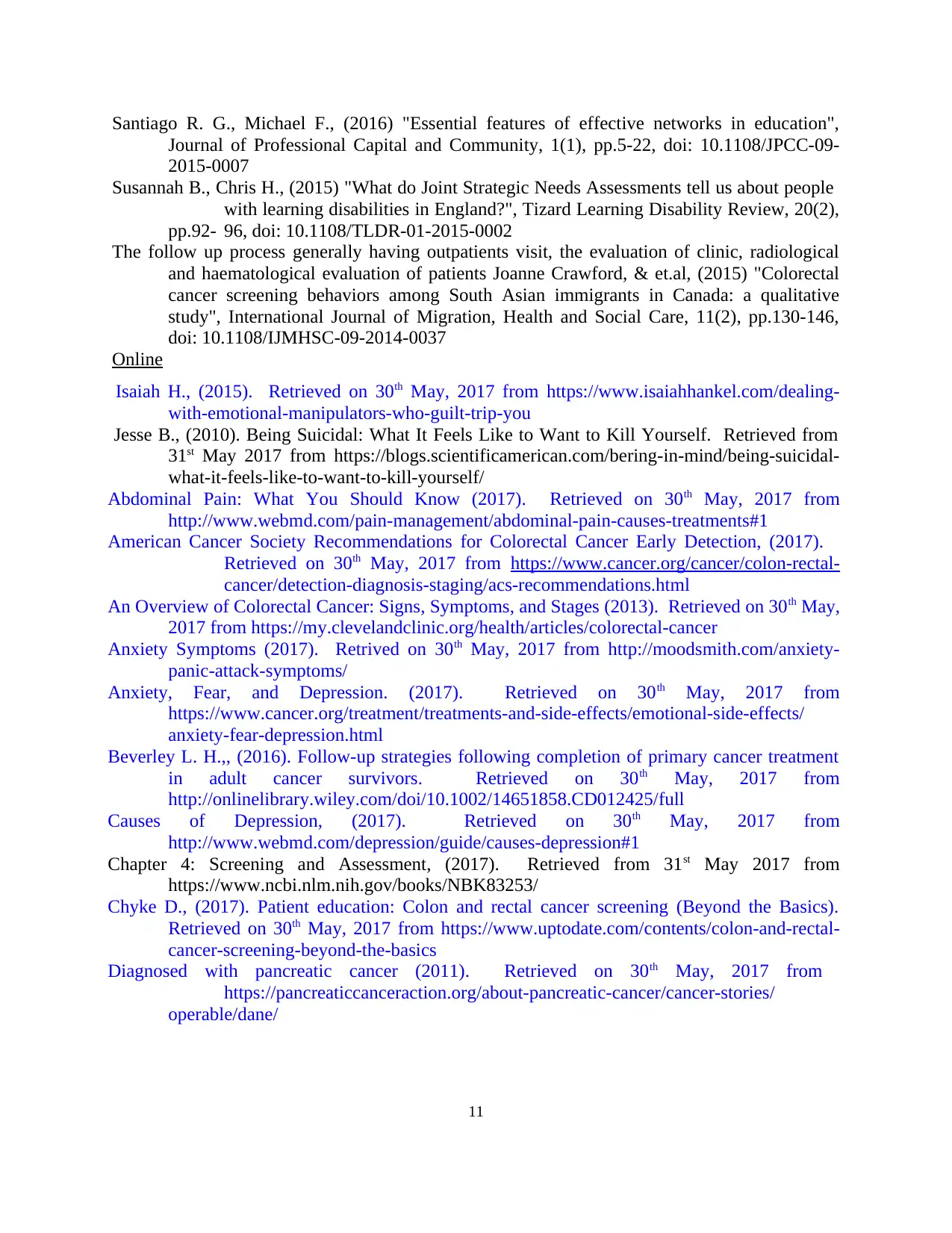
Santiago R. G., Michael F., (2016) "Essential features of effective networks in education",
Journal of Professional Capital and Community, 1(1), pp.5-22, doi: 10.1108/JPCC-09-
2015-0007
Susannah B., Chris H., (2015) "What do Joint Strategic Needs Assessments tell us about people
with learning disabilities in England?", Tizard Learning Disability Review, 20(2),
pp.92- 96, doi: 10.1108/TLDR-01-2015-0002
The follow up process generally having outpatients visit, the evaluation of clinic, radiological
and haematological evaluation of patients Joanne Crawford, & et.al, (2015) "Colorectal
cancer screening behaviors among South Asian immigrants in Canada: a qualitative
study", International Journal of Migration, Health and Social Care, 11(2), pp.130-146,
doi: 10.1108/IJMHSC-09-2014-0037
Online
Isaiah H., (2015). Retrieved on 30th May, 2017 from https://www.isaiahhankel.com/dealing-
with-emotional-manipulators-who-guilt-trip-you
Jesse B., (2010). Being Suicidal: What It Feels Like to Want to Kill Yourself. Retrieved from
31st May 2017 from https://blogs.scientificamerican.com/bering-in-mind/being-suicidal-
what-it-feels-like-to-want-to-kill-yourself/
Abdominal Pain: What You Should Know (2017). Retrieved on 30th May, 2017 from
http://www.webmd.com/pain-management/abdominal-pain-causes-treatments#1
American Cancer Society Recommendations for Colorectal Cancer Early Detection, (2017).
Retrieved on 30th May, 2017 from https://www.cancer.org/cancer/colon-rectal-
cancer/detection-diagnosis-staging/acs-recommendations.html
An Overview of Colorectal Cancer: Signs, Symptoms, and Stages (2013). Retrieved on 30th May,
2017 from https://my.clevelandclinic.org/health/articles/colorectal-cancer
Anxiety Symptoms (2017). Retrived on 30th May, 2017 from http://moodsmith.com/anxiety-
panic-attack-symptoms/
Anxiety, Fear, and Depression. (2017). Retrieved on 30th May, 2017 from
https://www.cancer.org/treatment/treatments-and-side-effects/emotional-side-effects/
anxiety-fear-depression.html
Beverley L. H.,, (2016). Follow-up strategies following completion of primary cancer treatment
in adult cancer survivors. Retrieved on 30th May, 2017 from
http://onlinelibrary.wiley.com/doi/10.1002/14651858.CD012425/full
Causes of Depression, (2017). Retrieved on 30th May, 2017 from
http://www.webmd.com/depression/guide/causes-depression#1
Chapter 4: Screening and Assessment, (2017). Retrieved from 31st May 2017 from
https://www.ncbi.nlm.nih.gov/books/NBK83253/
Chyke D., (2017). Patient education: Colon and rectal cancer screening (Beyond the Basics).
Retrieved on 30th May, 2017 from https://www.uptodate.com/contents/colon-and-rectal-
cancer-screening-beyond-the-basics
Diagnosed with pancreatic cancer (2011). Retrieved on 30th May, 2017 from
https://pancreaticcanceraction.org/about-pancreatic-cancer/cancer-stories/
operable/dane/
11
Journal of Professional Capital and Community, 1(1), pp.5-22, doi: 10.1108/JPCC-09-
2015-0007
Susannah B., Chris H., (2015) "What do Joint Strategic Needs Assessments tell us about people
with learning disabilities in England?", Tizard Learning Disability Review, 20(2),
pp.92- 96, doi: 10.1108/TLDR-01-2015-0002
The follow up process generally having outpatients visit, the evaluation of clinic, radiological
and haematological evaluation of patients Joanne Crawford, & et.al, (2015) "Colorectal
cancer screening behaviors among South Asian immigrants in Canada: a qualitative
study", International Journal of Migration, Health and Social Care, 11(2), pp.130-146,
doi: 10.1108/IJMHSC-09-2014-0037
Online
Isaiah H., (2015). Retrieved on 30th May, 2017 from https://www.isaiahhankel.com/dealing-
with-emotional-manipulators-who-guilt-trip-you
Jesse B., (2010). Being Suicidal: What It Feels Like to Want to Kill Yourself. Retrieved from
31st May 2017 from https://blogs.scientificamerican.com/bering-in-mind/being-suicidal-
what-it-feels-like-to-want-to-kill-yourself/
Abdominal Pain: What You Should Know (2017). Retrieved on 30th May, 2017 from
http://www.webmd.com/pain-management/abdominal-pain-causes-treatments#1
American Cancer Society Recommendations for Colorectal Cancer Early Detection, (2017).
Retrieved on 30th May, 2017 from https://www.cancer.org/cancer/colon-rectal-
cancer/detection-diagnosis-staging/acs-recommendations.html
An Overview of Colorectal Cancer: Signs, Symptoms, and Stages (2013). Retrieved on 30th May,
2017 from https://my.clevelandclinic.org/health/articles/colorectal-cancer
Anxiety Symptoms (2017). Retrived on 30th May, 2017 from http://moodsmith.com/anxiety-
panic-attack-symptoms/
Anxiety, Fear, and Depression. (2017). Retrieved on 30th May, 2017 from
https://www.cancer.org/treatment/treatments-and-side-effects/emotional-side-effects/
anxiety-fear-depression.html
Beverley L. H.,, (2016). Follow-up strategies following completion of primary cancer treatment
in adult cancer survivors. Retrieved on 30th May, 2017 from
http://onlinelibrary.wiley.com/doi/10.1002/14651858.CD012425/full
Causes of Depression, (2017). Retrieved on 30th May, 2017 from
http://www.webmd.com/depression/guide/causes-depression#1
Chapter 4: Screening and Assessment, (2017). Retrieved from 31st May 2017 from
https://www.ncbi.nlm.nih.gov/books/NBK83253/
Chyke D., (2017). Patient education: Colon and rectal cancer screening (Beyond the Basics).
Retrieved on 30th May, 2017 from https://www.uptodate.com/contents/colon-and-rectal-
cancer-screening-beyond-the-basics
Diagnosed with pancreatic cancer (2011). Retrieved on 30th May, 2017 from
https://pancreaticcanceraction.org/about-pancreatic-cancer/cancer-stories/
operable/dane/
11
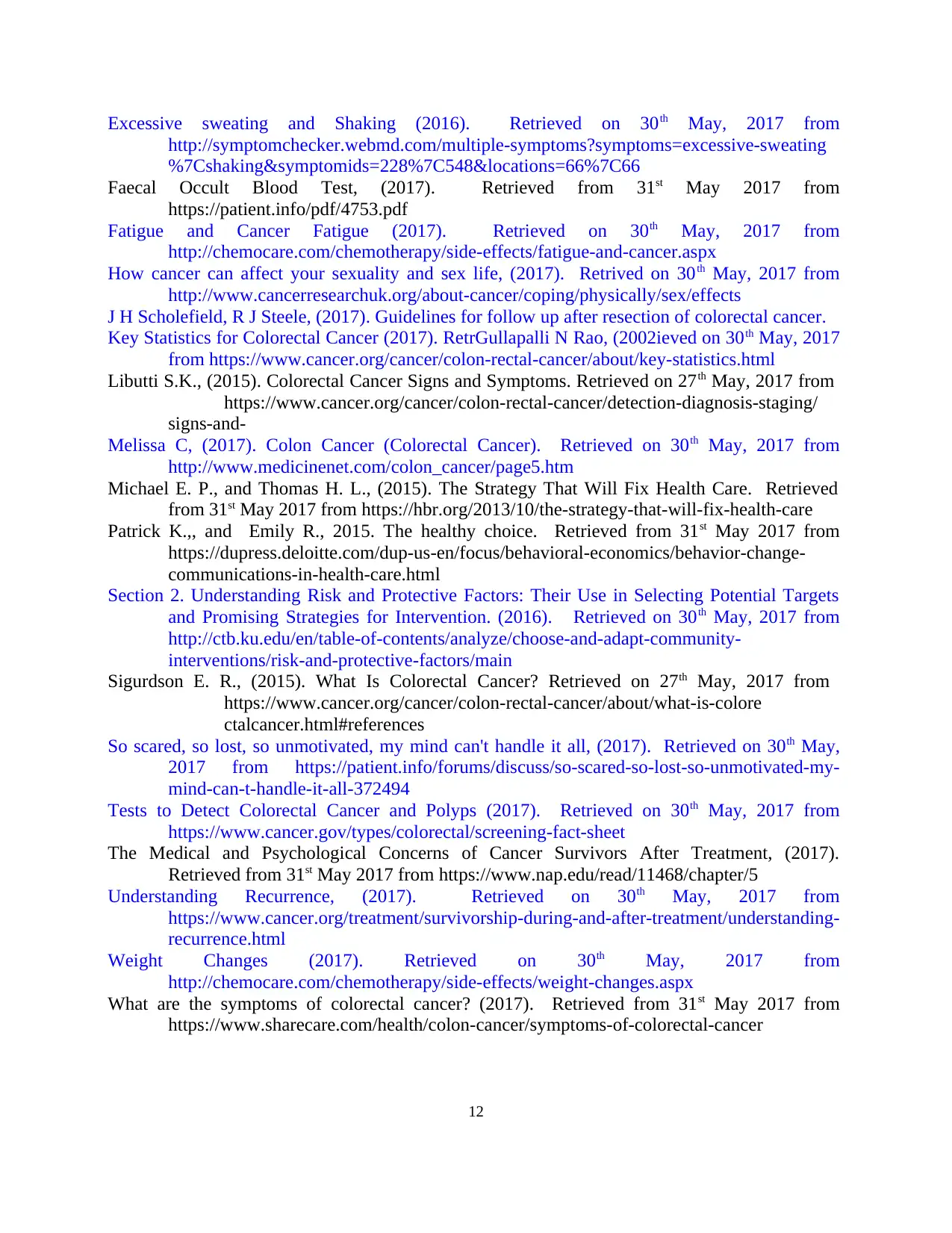
Excessive sweating and Shaking (2016). Retrieved on 30th May, 2017 from
http://symptomchecker.webmd.com/multiple-symptoms?symptoms=excessive-sweating
%7Cshaking&symptomids=228%7C548&locations=66%7C66
Faecal Occult Blood Test, (2017). Retrieved from 31st May 2017 from
https://patient.info/pdf/4753.pdf
Fatigue and Cancer Fatigue (2017). Retrieved on 30th May, 2017 from
http://chemocare.com/chemotherapy/side-effects/fatigue-and-cancer.aspx
How cancer can affect your sexuality and sex life, (2017). Retrived on 30th May, 2017 from
http://www.cancerresearchuk.org/about-cancer/coping/physically/sex/effects
J H Scholefield, R J Steele, (2017). Guidelines for follow up after resection of colorectal cancer.
Key Statistics for Colorectal Cancer (2017). RetrGullapalli N Rao, (2002ieved on 30th May, 2017
from https://www.cancer.org/cancer/colon-rectal-cancer/about/key-statistics.html
Libutti S.K., (2015). Colorectal Cancer Signs and Symptoms. Retrieved on 27th May, 2017 from
https://www.cancer.org/cancer/colon-rectal-cancer/detection-diagnosis-staging/
signs-and-
Melissa C, (2017). Colon Cancer (Colorectal Cancer). Retrieved on 30th May, 2017 from
http://www.medicinenet.com/colon_cancer/page5.htm
Michael E. P., and Thomas H. L., (2015). The Strategy That Will Fix Health Care. Retrieved
from 31st May 2017 from https://hbr.org/2013/10/the-strategy-that-will-fix-health-care
Patrick K.,, and Emily R., 2015. The healthy choice. Retrieved from 31st May 2017 from
https://dupress.deloitte.com/dup-us-en/focus/behavioral-economics/behavior-change-
communications-in-health-care.html
Section 2. Understanding Risk and Protective Factors: Their Use in Selecting Potential Targets
and Promising Strategies for Intervention. (2016). Retrieved on 30th May, 2017 from
http://ctb.ku.edu/en/table-of-contents/analyze/choose-and-adapt-community-
interventions/risk-and-protective-factors/main
Sigurdson E. R., (2015). What Is Colorectal Cancer? Retrieved on 27th May, 2017 from
https://www.cancer.org/cancer/colon-rectal-cancer/about/what-is-colore
ctalcancer.html#references
So scared, so lost, so unmotivated, my mind can't handle it all, (2017). Retrieved on 30th May,
2017 from https://patient.info/forums/discuss/so-scared-so-lost-so-unmotivated-my-
mind-can-t-handle-it-all-372494
Tests to Detect Colorectal Cancer and Polyps (2017). Retrieved on 30th May, 2017 from
https://www.cancer.gov/types/colorectal/screening-fact-sheet
The Medical and Psychological Concerns of Cancer Survivors After Treatment, (2017).
Retrieved from 31st May 2017 from https://www.nap.edu/read/11468/chapter/5
Understanding Recurrence, (2017). Retrieved on 30th May, 2017 from
https://www.cancer.org/treatment/survivorship-during-and-after-treatment/understanding-
recurrence.html
Weight Changes (2017). Retrieved on 30th May, 2017 from
http://chemocare.com/chemotherapy/side-effects/weight-changes.aspx
What are the symptoms of colorectal cancer? (2017). Retrieved from 31st May 2017 from
https://www.sharecare.com/health/colon-cancer/symptoms-of-colorectal-cancer
12
http://symptomchecker.webmd.com/multiple-symptoms?symptoms=excessive-sweating
%7Cshaking&symptomids=228%7C548&locations=66%7C66
Faecal Occult Blood Test, (2017). Retrieved from 31st May 2017 from
https://patient.info/pdf/4753.pdf
Fatigue and Cancer Fatigue (2017). Retrieved on 30th May, 2017 from
http://chemocare.com/chemotherapy/side-effects/fatigue-and-cancer.aspx
How cancer can affect your sexuality and sex life, (2017). Retrived on 30th May, 2017 from
http://www.cancerresearchuk.org/about-cancer/coping/physically/sex/effects
J H Scholefield, R J Steele, (2017). Guidelines for follow up after resection of colorectal cancer.
Key Statistics for Colorectal Cancer (2017). RetrGullapalli N Rao, (2002ieved on 30th May, 2017
from https://www.cancer.org/cancer/colon-rectal-cancer/about/key-statistics.html
Libutti S.K., (2015). Colorectal Cancer Signs and Symptoms. Retrieved on 27th May, 2017 from
https://www.cancer.org/cancer/colon-rectal-cancer/detection-diagnosis-staging/
signs-and-
Melissa C, (2017). Colon Cancer (Colorectal Cancer). Retrieved on 30th May, 2017 from
http://www.medicinenet.com/colon_cancer/page5.htm
Michael E. P., and Thomas H. L., (2015). The Strategy That Will Fix Health Care. Retrieved
from 31st May 2017 from https://hbr.org/2013/10/the-strategy-that-will-fix-health-care
Patrick K.,, and Emily R., 2015. The healthy choice. Retrieved from 31st May 2017 from
https://dupress.deloitte.com/dup-us-en/focus/behavioral-economics/behavior-change-
communications-in-health-care.html
Section 2. Understanding Risk and Protective Factors: Their Use in Selecting Potential Targets
and Promising Strategies for Intervention. (2016). Retrieved on 30th May, 2017 from
http://ctb.ku.edu/en/table-of-contents/analyze/choose-and-adapt-community-
interventions/risk-and-protective-factors/main
Sigurdson E. R., (2015). What Is Colorectal Cancer? Retrieved on 27th May, 2017 from
https://www.cancer.org/cancer/colon-rectal-cancer/about/what-is-colore
ctalcancer.html#references
So scared, so lost, so unmotivated, my mind can't handle it all, (2017). Retrieved on 30th May,
2017 from https://patient.info/forums/discuss/so-scared-so-lost-so-unmotivated-my-
mind-can-t-handle-it-all-372494
Tests to Detect Colorectal Cancer and Polyps (2017). Retrieved on 30th May, 2017 from
https://www.cancer.gov/types/colorectal/screening-fact-sheet
The Medical and Psychological Concerns of Cancer Survivors After Treatment, (2017).
Retrieved from 31st May 2017 from https://www.nap.edu/read/11468/chapter/5
Understanding Recurrence, (2017). Retrieved on 30th May, 2017 from
https://www.cancer.org/treatment/survivorship-during-and-after-treatment/understanding-
recurrence.html
Weight Changes (2017). Retrieved on 30th May, 2017 from
http://chemocare.com/chemotherapy/side-effects/weight-changes.aspx
What are the symptoms of colorectal cancer? (2017). Retrieved from 31st May 2017 from
https://www.sharecare.com/health/colon-cancer/symptoms-of-colorectal-cancer
12
⊘ This is a preview!⊘
Do you want full access?
Subscribe today to unlock all pages.

Trusted by 1+ million students worldwide
1 out of 13
Related Documents
Your All-in-One AI-Powered Toolkit for Academic Success.
+13062052269
info@desklib.com
Available 24*7 on WhatsApp / Email
![[object Object]](/_next/static/media/star-bottom.7253800d.svg)
Unlock your academic potential
Copyright © 2020–2025 A2Z Services. All Rights Reserved. Developed and managed by ZUCOL.




